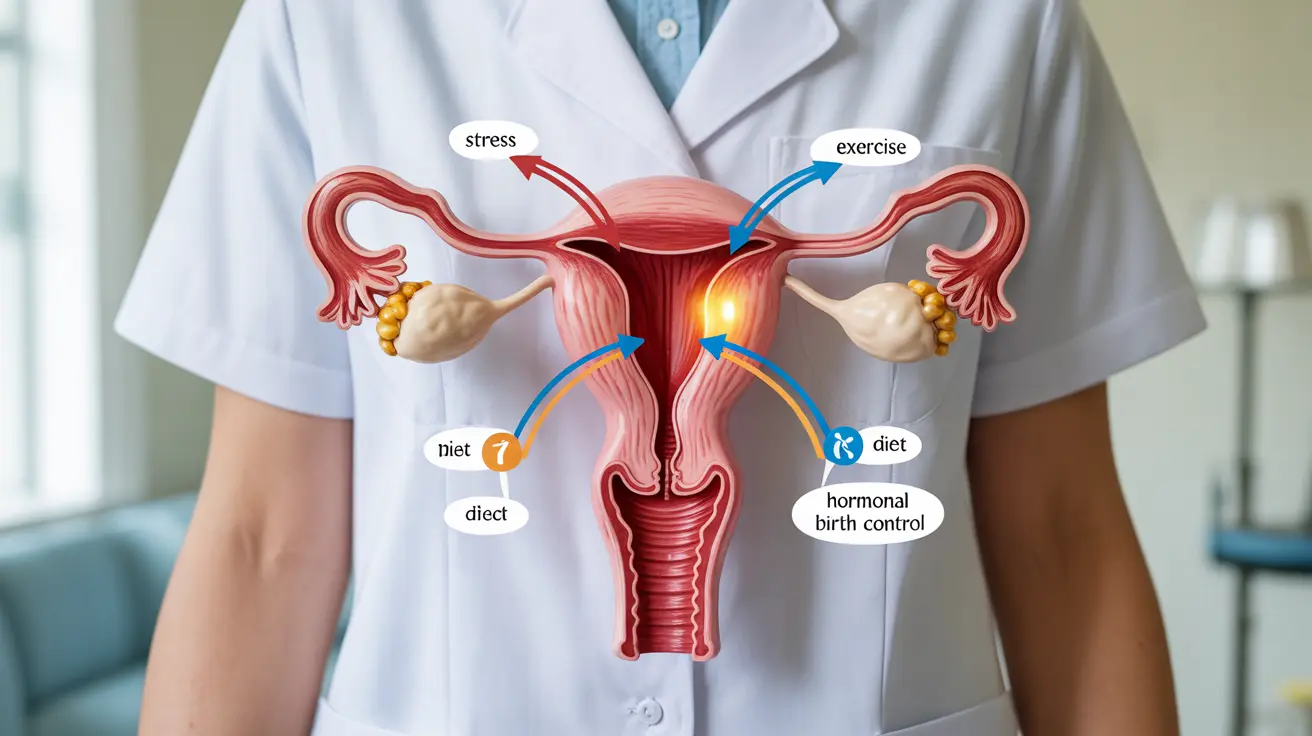Missing a period can be an unsettling experience that raises many questions and concerns. While a regular menstrual cycle is typically a sign of good reproductive health, there are numerous reasons why someone might occasionally miss their period. Understanding these causes can help alleviate anxiety and determine when medical attention might be necessary.
This comprehensive guide explores the various factors that can lead to a missed period, from common lifestyle influences to underlying medical conditions, and provides guidance on when to consult a healthcare provider.
Common Lifestyle Factors Affecting Your Menstrual Cycle
Several everyday lifestyle factors can influence your menstrual cycle and potentially cause a missed period:
- Significant changes in weight
- Intense exercise routines
- Poor sleep patterns
- Dietary changes or restrictions
- Travel and time zone changes
- Environmental changes
These factors can temporarily disrupt your body's hormonal balance, leading to menstrual irregularities. Usually, once these factors stabilize, your cycle should return to normal.
The Impact of Stress on Menstrual Cycles
Stress plays a significant role in menstrual health, affecting the hypothalamic-pituitary-adrenal (HPA) axis, which regulates various hormones involved in the menstrual cycle. During periods of high stress, your body may temporarily stop ovulating, leading to missed periods.
Common stress-related factors that can affect your cycle include:
- Work-related pressure
- Major life changes
- Relationship difficulties
- Financial concerns
- Academic stress
- Family problems
Birth Control and Menstrual Changes
Different forms of birth control can significantly impact your menstrual cycle. Hormonal birth control methods may cause:
- Lighter periods
- Missed periods
- Irregular bleeding
- Complete absence of periods (amenorrhea)
These effects vary depending on the type of birth control used and typically resolve within a few months after discontinuation. However, it's important to understand that these changes are usually expected and not cause for concern.
Medical Conditions Associated with Missed Periods
Several medical conditions can cause irregular or missed periods:
Polycystic Ovary Syndrome (PCOS)
PCOS is a common hormonal disorder that can cause irregular or missed periods, along with other symptoms such as acne, excess hair growth, and weight gain.
Thyroid Disorders
Both hypothyroidism and hyperthyroidism can affect menstrual regularity by disrupting hormone balance.
Other Medical Conditions
Additional conditions that may cause missed periods include:
- Premature ovarian failure
- Uterine fibroids
- Endometriosis
- Chronic diseases
- Certain medications
When to Consult a Healthcare Provider
While occasional missed periods might not be cause for concern, certain situations warrant medical attention:
- Three or more consecutive missed periods
- Sudden changes in cycle length or regularity
- Unusual bleeding patterns
- Severe pain or cramping
- Associated symptoms like significant weight changes or hair loss
Frequently Asked Questions
Is it normal to miss a period occasionally, and what common lifestyle factors can cause this?
Yes, it's relatively normal to occasionally miss a period. Common lifestyle factors that can cause this include significant stress, sudden weight changes, intense exercise, travel, and major lifestyle modifications. These temporary disruptions usually resolve once the underlying factor is addressed.
How does stress affect menstrual cycles and lead to missed periods?
Stress can interfere with the hormones that regulate your menstrual cycle by affecting the hypothalamic-pituitary-adrenal axis. This can delay or prevent ovulation, leading to missed or irregular periods. Both acute and chronic stress can have this effect on your cycle.
Can birth control methods cause missed or irregular periods, and how long do these effects last?
Yes, birth control methods can cause missed or irregular periods, particularly hormonal options. These effects are usually temporary and can last for several months after starting or stopping birth control. The timeline for normalization varies by individual and method used.
What medical conditions like PCOS or thyroid problems can cause consistently missed periods?
Several medical conditions can cause missed periods, including PCOS, thyroid disorders, premature ovarian failure, and endometriosis. These conditions typically require medical diagnosis and treatment to manage menstrual irregularities effectively.
When should I see a doctor if I keep missing my period regularly?
You should consult a healthcare provider if you miss three or more consecutive periods, experience sudden changes in your cycle, have unusual bleeding, severe pain, or develop additional concerning symptoms. This is especially important if you're sexually active and pregnancy is possible.




